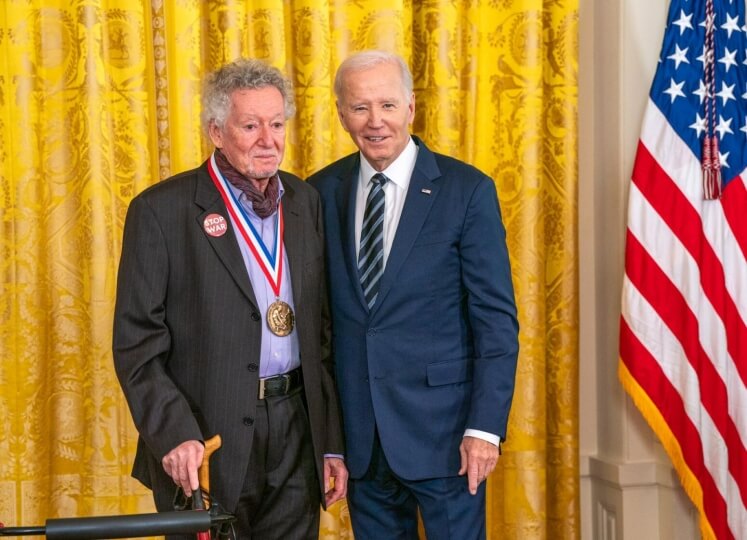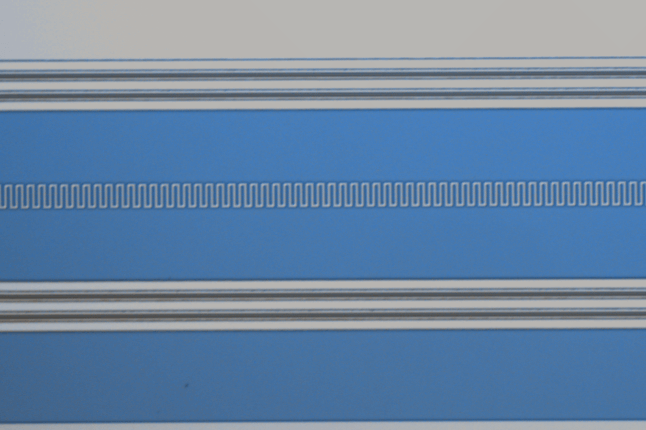News
Sheldon Weinbaum, S.M. '60, Ph.D. '63, receives the Medal of Science from President Joe Biden (Photo courtesy of Ryan K. Morris and the National Science and Technology Medals Foundation)
In the long list of Sheldon Weinbaum’s accomplishments as a researcher and advocate for diversity in STEM, it’s the one thing he didn’t do that drives him the most. In 1963, Weinbaum, S.M. '60, Ph.D. '63, had just completed his Ph.D. in Applied Physics in what was then the Division of Engineering and Applied Physics at Harvard — now the Harvard John A. Paulson School of Engineering and Applied Sciences (SEAS). Like most newly hooded Ph.Ds., Weinbaum was focused on the start of his career, so when the opportunity came to go to the March on Washington in August of 1963, Weinbaum passed. In doing so, he missed witnessing Martin Luther King’s landmark “I have a dream” speech and one of the most crucial moments of the Civil Rights movement.
“There was a space for me on that bus, and I did not occupy it,” Weinbaum said. “It has lived with me for my entire life.”
Weinbaum decided he wouldn’t sit out again.
When Black and Puerto Rican students protested for racial equity at the City College of New York (CCNY) in 1969, where Weinbaum served on the faculty, he stood arm-in-arm with the students, receiving a censure from the faculty for doing so.
When there were no female engineering faculty to advise CCNY’s first Society of Women Engineers in 1976, Weinbaum became their advisor.
When it became apparent that more work needed to be done to recruit undergraduate engineering students from underrepresented minorities, Weinbaum obtained funding from the college to start summer high school outreach programs to majority minority schools, and CCNY quickly became one of the most diverse engineering departments nationwide. He even served as lead plaintiff and organizer of a 1992 lawsuit against the state of New York over racial bias in budgeting for City University of New York and State University of New York.
He’s done all this alongside his own extremely accomplished career as a bioengineer. He holds the rare distinction of membership in the three most prestigious national academies, the National Academy of Sciences, National Academy of Engineering and National Academy of Medicine. He’s now the CUNY Distinguished Professor Emeritus of Biomedical and Mechanical Engineering, and last year received the U.S. National Medal of Science.
You have to start at the top like that to really change things. In the National Academy of Science, last year we had an equal number of women and men elected, which would’ve been unheard of in previous eras.
Born in Brooklyn, Weinbaum came to Harvard after getting his undergraduate degree in aeronautical engineering from Rensselaer Polytechnic Institute in New York. His research here was funded through both a Gordon McKay Prize Fellowship and National Science Foundation Fellowship, and his dissertation on heat convection in horizontal cylinders was done under the mentorship of George Carrier, T. Jefferson Coolidge Professor of Applied Mathematics.
Focusing on mechanical engineering at Harvard set up Weinbaum for his work at Avco-Everett Research Laboratory and then as a theoretical aerodynamicist at General Electric, where he received a government grant to work in the missiles and space division as part of the Vietnam War effort. His career in weapons development didn’t last, as he and his wife Alexandra became more involved in anti-war efforts throughout the 1960s. He eventually returned his federal grant and joined the CCNY faculty in 1967.
Not long after joining the CCNY faculty, Weinbaum brought in Yuan-Cheng Fung, considered the founder of modern biomechanics, as a visiting speaker. Weinbaum already had an interest in bioengineering because his father-in-law was an ophthalmologist and head of the glaucoma clinic at the Wills Eye Hospital in Philadelphia. Through Fung, Weinbaum was introduced to other biomechanics researchers in the field.
“That started a much more serious interest in the field,” he said. “I decided to go into biomechanics.”
Biomechanics became the center of Weinbaum’s research for the rest of his career. Some of his most impactful research involved fluid dynamics through bones, the causes of rupture in the vulnerable plaque of arterial walls that can lead to heart attacks, and how the microscopic cellular membrane protrusions known as microvilli sense fluid movement in renal cells.
No one at that time had made a mathematical model that could describe the fluid changes between the chambers of the eye, and how that interacted with glaucoma. That was the first problem I ever took on in bioengineering.
At every step alongside his own accomplishments, Weinbaum has also sought to diversify his field. In his first 20 years on the faculty at CCNY, not one woman had received an engineering Ph.D. During a 1986 sabbatical, Weinbaum traveled to China, where he went to numerous colleges and universities to encourage women to apply to be his Ph.D. students at CCNY.
“Since I went to China, 17 of my last 27 Ph.D. students have been women,” he said. “Once everyone learned about this, my female applicants weren’t just from China.”
He received the Public Service Award of the Fund for the City of New York in 1988. Since then, Weinbaum has also created programs to further minority matriculation to graduate schools. Grants from the National Institutes of Health allowed him to start a minority scholars program, which every year supported 25 biomedical engineering students. More than half went on to Ph.D. or M.D. programs.
“The key to that program was having all of those high-achieving undergraduates have a Ph.D. fellow that would meet with them every week to take them through the whole process of getting into research and becoming a graduate student,” he said.
Even as he’s transitioned to his emeritus status at CCNY, the work continues, as does the recognition. The National Medal of Science last year was just the latest in a line of awards, including the Franklin Institute’s 2022 Benjamin Franklin Medal in Biomedical Engineering, and the National Science Foundation 2020 Presidential Award for Excellence in Science, Mathematics, and Engineering Mentoring.
This year, Weinbaum provided support for a Distinguished Lecture series run by the Office of Diversity, Inclusion and Belonging at SEAS. The first lecture, to be held on Nov. 8th, will feature Paula Hammond, professor of chemical engineering and Vice Provost for Faculty at MIT, as the inaugural speaker.
Topics: Academics, Applied Physics, Alumni, Bioengineering, Diversity / Inclusion
Cutting-edge science delivered direct to your inbox.
Join the Harvard SEAS mailing list.



